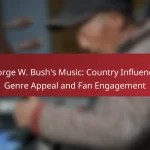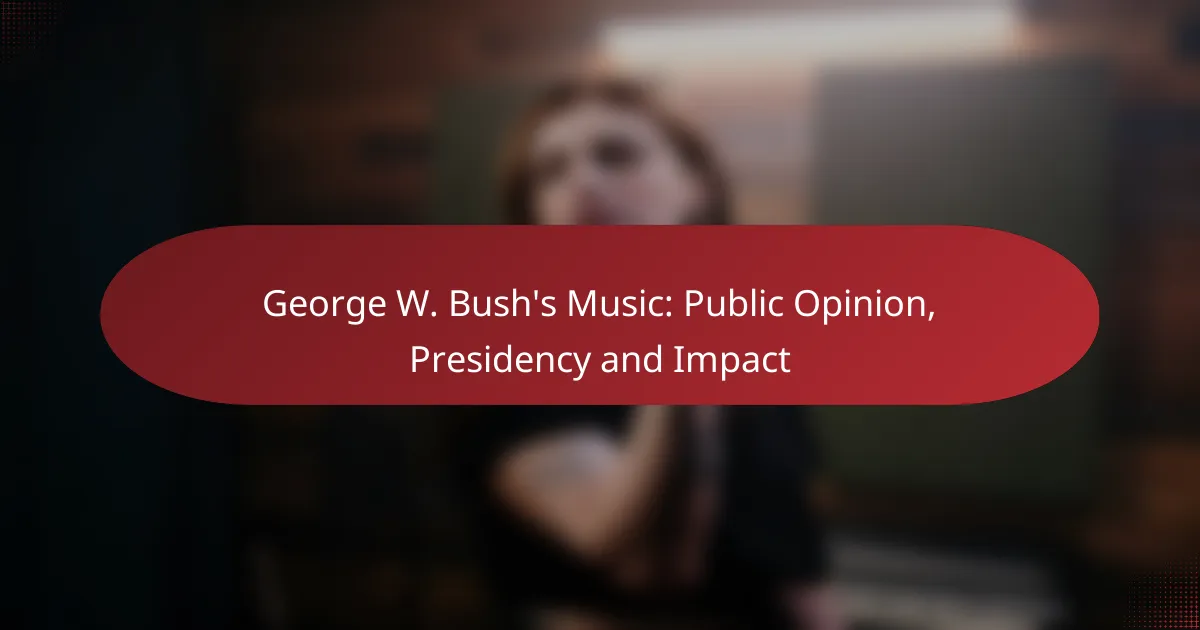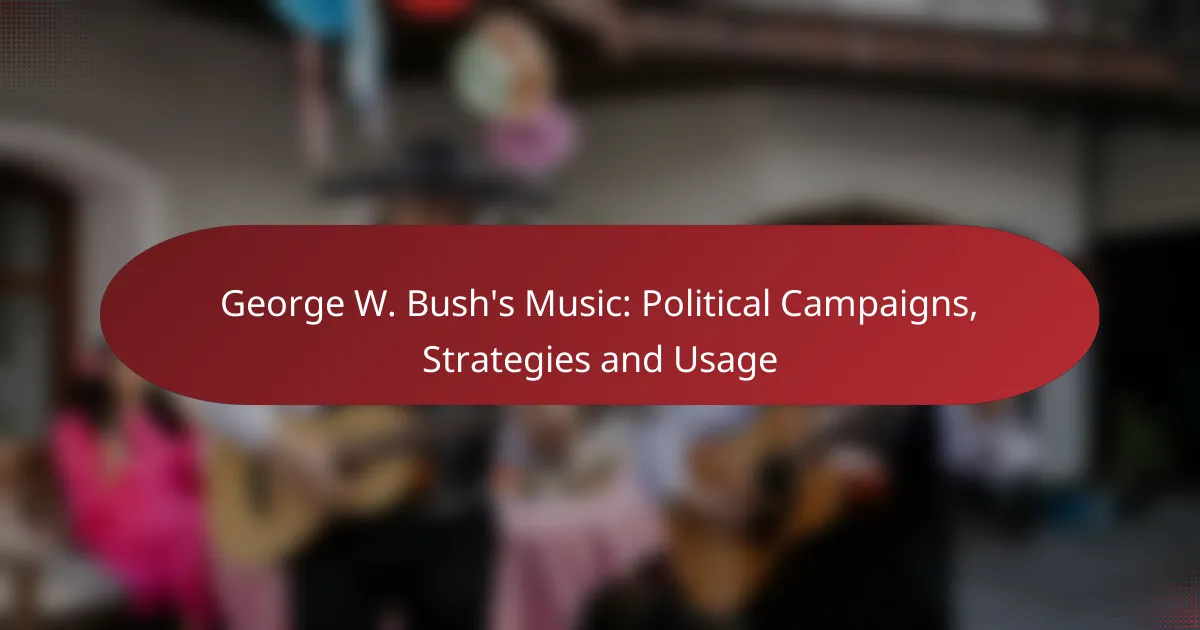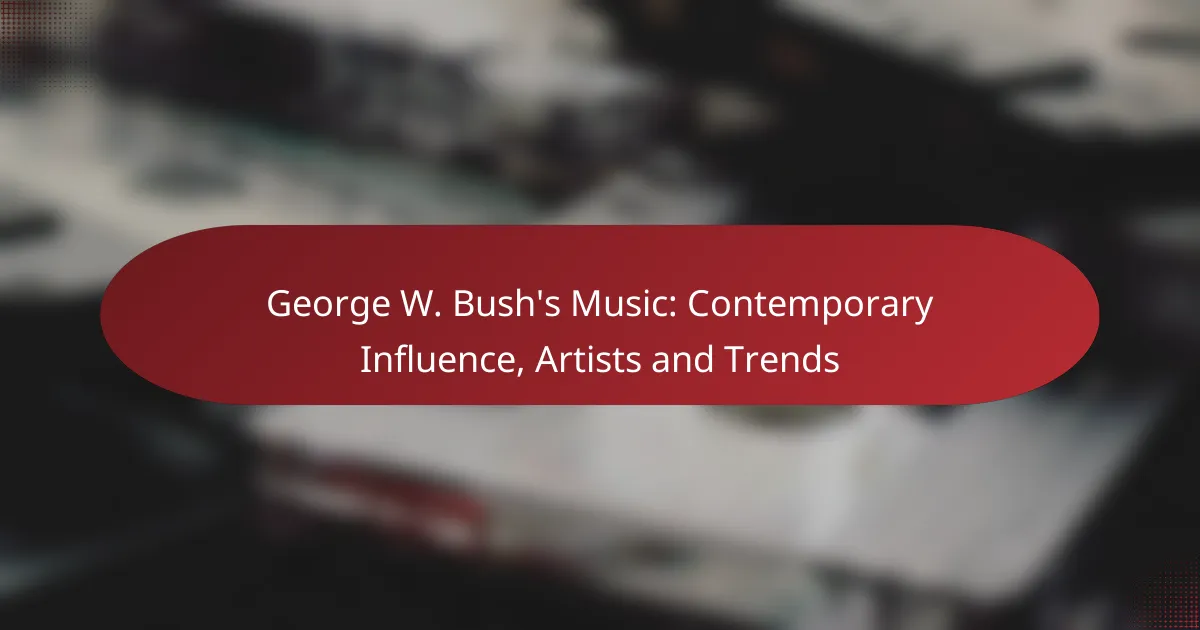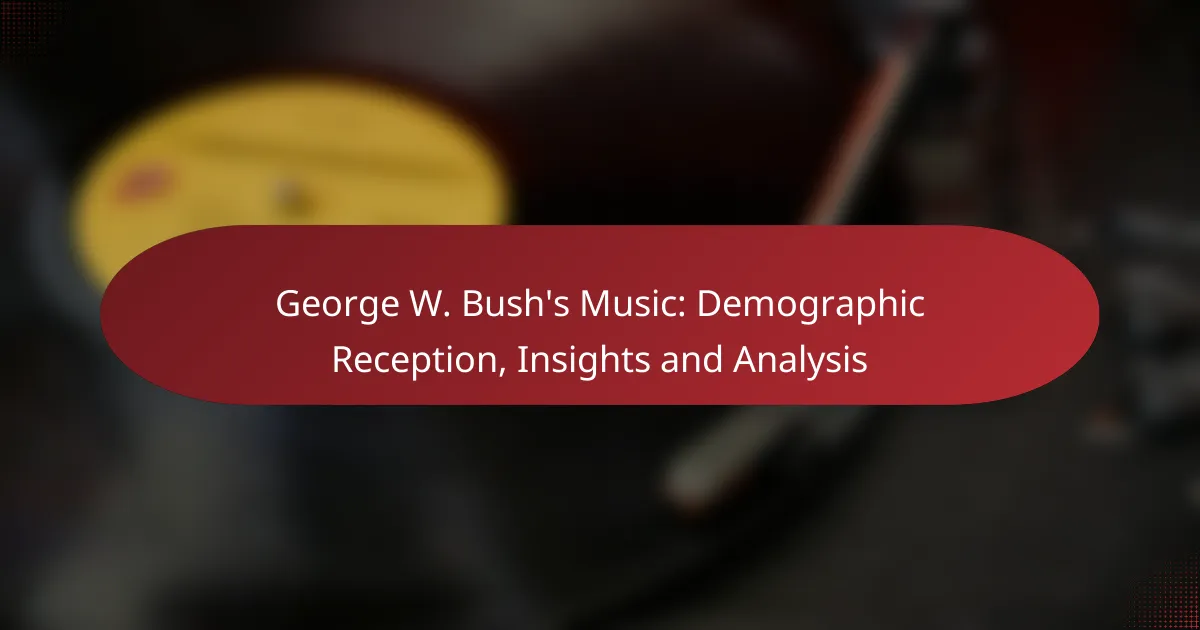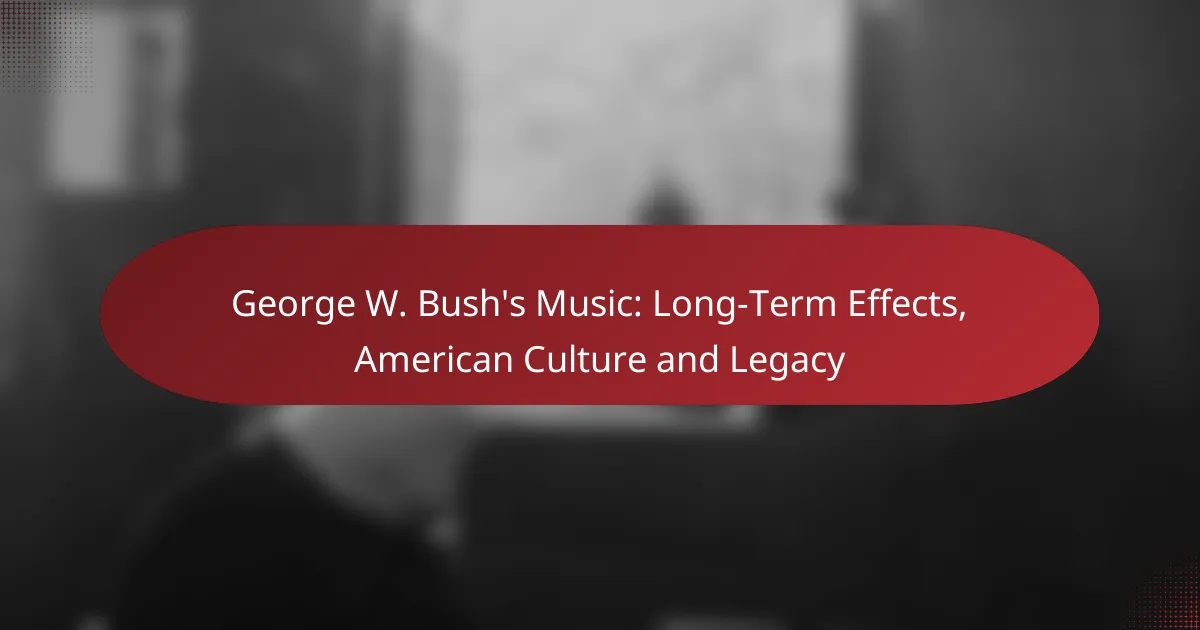George W. Bush’s music choices significantly influenced public opinion throughout his presidency, serving as a powerful tool to forge emotional connections with voters. By incorporating music into political events, he not only reflected the political climate but also conveyed messages that resonated with the American public, emphasizing themes of patriotism and resilience. His selections often mirrored his personal values and Texan roots, shaping perceptions of his leadership style during key moments in his administration.
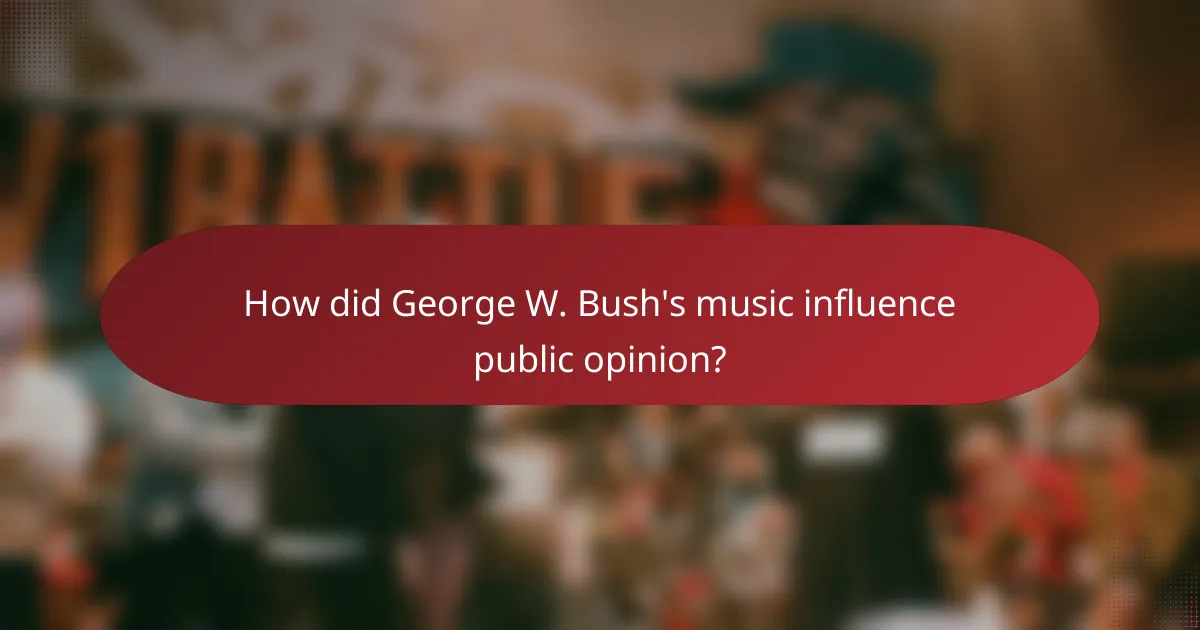
How did George W. Bush’s music influence public opinion?
George W. Bush’s music choices played a significant role in shaping public opinion during his presidency. His use of music in political settings helped to create emotional connections with voters and influenced perceptions of his leadership style.
Impact on political campaigns
Music was strategically used in George W. Bush’s political campaigns to evoke specific emotions and reinforce campaign messages. For instance, songs like “God Bless the U.S.A.” were frequently played at rallies, appealing to patriotic sentiments and fostering a sense of unity among supporters.
Campaigns often selected music that resonated with target demographics, enhancing voter engagement. This tactic not only helped to energize crowds but also created memorable associations between the music and Bush’s political brand.
Shaping cultural narratives
Bush’s musical preferences contributed to broader cultural narratives surrounding his presidency. By aligning himself with country music and artists who embodied traditional American values, he positioned himself as a relatable figure to many voters.
The choice of music also reflected and shaped public discourse on issues like national security and patriotism, reinforcing his administration’s messaging during critical moments, such as post-9/11.
Public reception and criticism
The public’s reception of Bush’s music choices was mixed, with some praising his ability to connect through music while others criticized his taste. Supporters often viewed his selections as genuine expressions of American values, while detractors argued that they were overly simplistic or pandering.
Critics pointed to instances where the use of certain songs sparked controversy, particularly when artists expressed discontent with his policies. This backlash highlighted the complex relationship between music and political identity during his presidency.
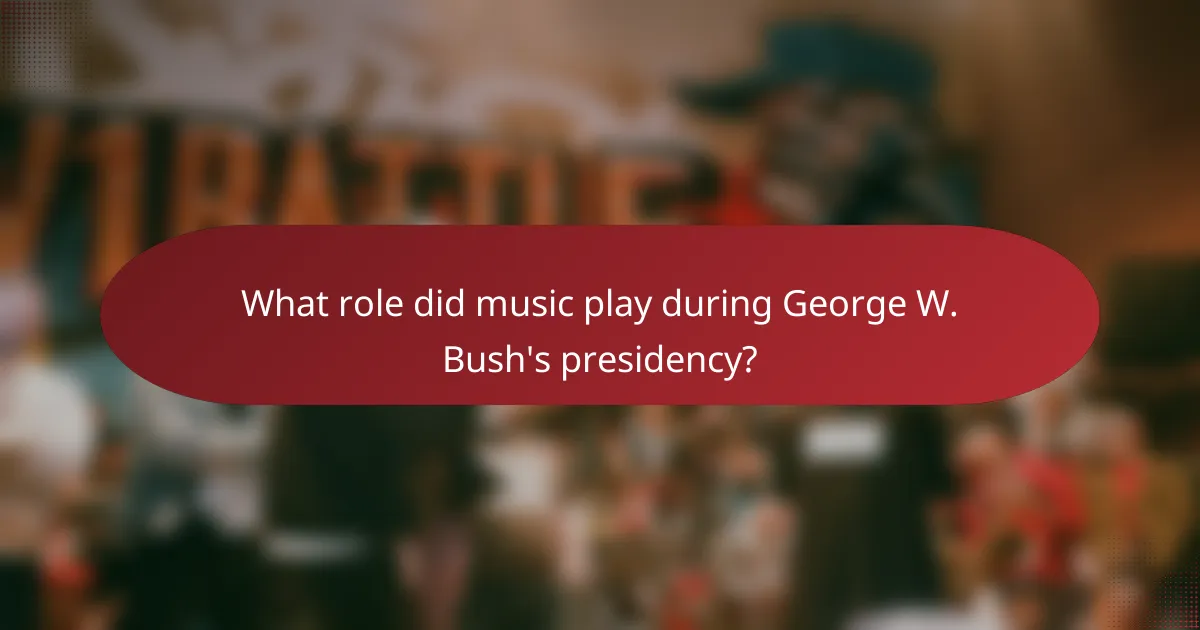
What role did music play during George W. Bush’s presidency?
Music played a significant role during George W. Bush’s presidency, serving as a backdrop to key events and reflecting the political climate of the time. It was used to convey messages, evoke emotions, and connect with the public during both celebratory and somber occasions.
Music in presidential events
During George W. Bush’s presidency, music was a staple at various presidential events, including inaugurations, state dinners, and public appearances. Artists like Toby Keith and Bruce Springsteen performed at events, showcasing a range of musical genres that appealed to different demographics. These performances often aimed to unite the audience and reinforce the themes of the event.
For instance, at his second inauguration in 2005, Bush featured performances by renowned artists, which helped to create a festive atmosphere. Music at these events not only entertained but also served to highlight the administration’s values and priorities.
Soundtrack of the White House
The White House under Bush had a diverse musical soundtrack that included country, rock, and classical music. The selection often reflected Bush’s personal tastes and the cultural landscape of the early 2000s. Notable songs played during his presidency included patriotic anthems and contemporary hits that resonated with American sentiments.
Additionally, the White House hosted numerous concerts and events featuring various artists, which contributed to a vibrant cultural scene. These musical gatherings were not just entertainment; they also served as opportunities for diplomacy and cultural exchange, showcasing the arts as a means to connect with both domestic and international audiences.
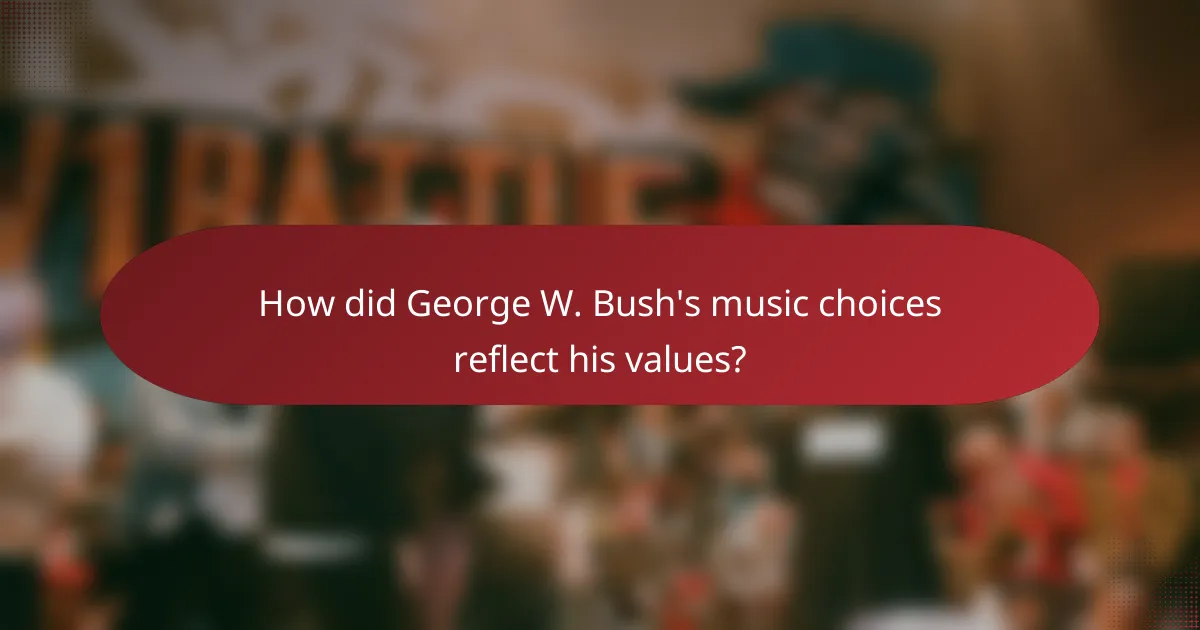
How did George W. Bush’s music choices reflect his values?
George W. Bush’s music selections often mirrored his personal values, emphasizing themes of patriotism, resilience, and traditional American culture. His preferences showcased a connection to his Texan roots and a desire to resonate with the American public during his presidency.
Country music preferences
George W. Bush had a strong affinity for country music, which reflected his Southern upbringing and appeal to mainstream American values. Artists like Alan Jackson and Toby Keith were among his favorites, often embodying themes of hard work and family. This genre’s storytelling approach resonated with his image as a relatable, down-to-earth leader.
During his presidency, Bush frequently attended country music events and even invited artists to perform at the White House. This not only reinforced his connection to the genre but also helped him engage with a significant portion of the American electorate who identified with country music’s values.
Patriotic anthems
Patriotic anthems played a crucial role in George W. Bush’s music choices, especially following the events of September 11, 2001. Songs like “God Bless the USA” by Lee Greenwood became emblematic of his presidency, symbolizing national unity and resilience in the face of adversity. These anthems were often played at public events, reinforcing a sense of patriotism among Americans.
Bush’s use of patriotic music was strategic, aiming to evoke emotional responses and rally support during challenging times. By aligning himself with these anthems, he sought to strengthen national pride and foster a collective identity among citizens, particularly during periods of conflict and uncertainty.
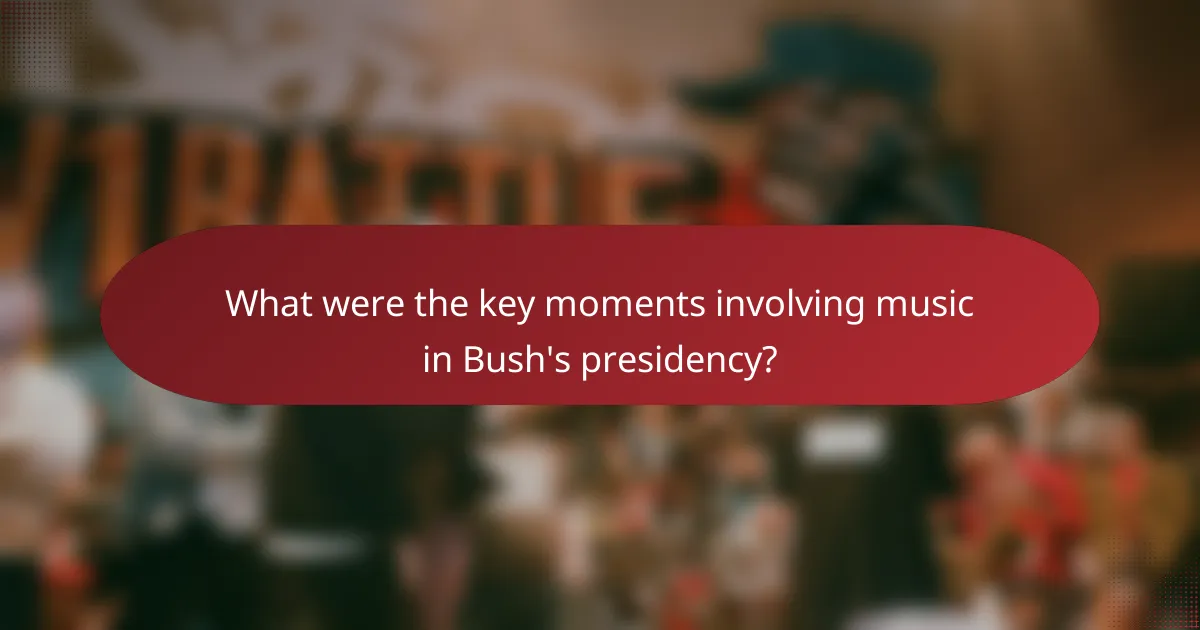
What were the key moments involving music in Bush’s presidency?
Key moments involving music during George W. Bush’s presidency include significant tributes following the 9/11 attacks and the use of music at campaign rallies. These instances highlighted how music served as a tool for unity, patriotism, and political messaging during his administration.
Post-9/11 musical tributes
In the aftermath of the September 11 attacks, music played a crucial role in national healing and remembrance. Various artists and bands performed tributes that resonated with the public’s grief and resilience, such as the “Concert for New York City” featuring prominent musicians like Paul McCartney and Billy Joel.
These tributes often included songs that emphasized themes of hope and unity, helping to foster a sense of community among Americans. The emotional impact of these performances was significant, as they provided a platform for collective mourning and reflection.
Campaign rallies and concerts
During his presidential campaigns, George W. Bush utilized music to energize supporters and create a memorable atmosphere at rallies. Popular songs from artists like Toby Keith and Kid Rock were frequently played, reinforcing themes of patriotism and American values.
Music at these events not only entertained but also served to align Bush’s image with the sentiments of his base. The strategic selection of songs helped to evoke emotional responses, encouraging voter engagement and support throughout his campaigns.
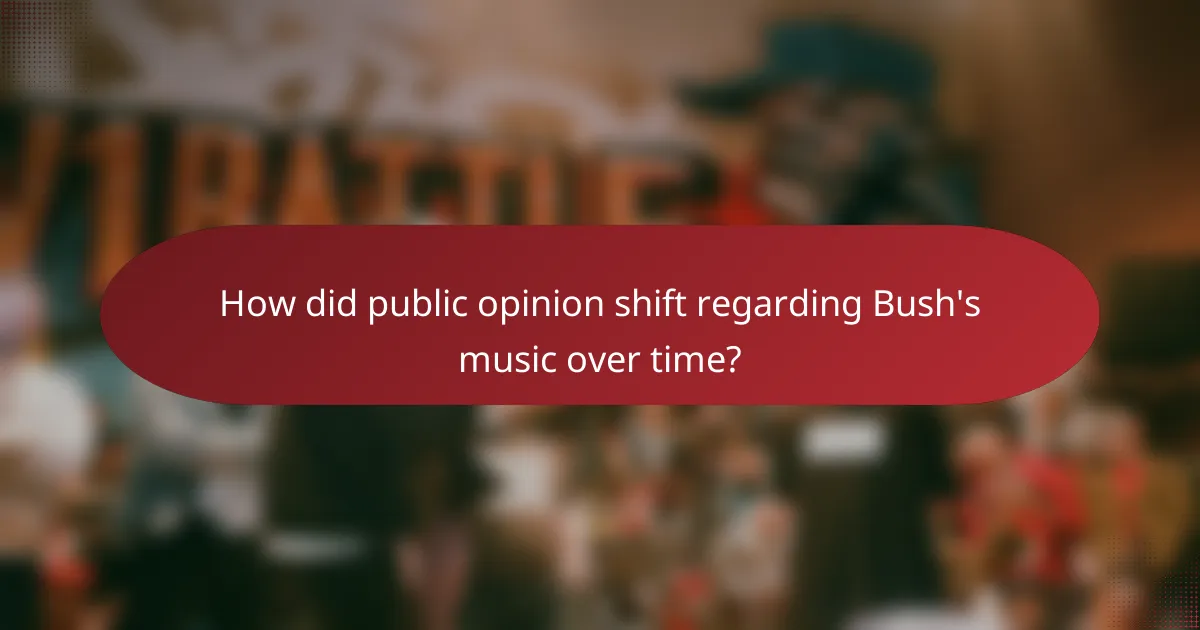
How did public opinion shift regarding Bush’s music over time?
Public opinion regarding George W. Bush’s music evolved significantly during his presidency, initially receiving a warm reception but later facing criticism as political sentiments changed. This shift reflects broader societal attitudes towards his administration and the cultural context of the time.
Initial popularity vs. later criticism
At the beginning of his presidency, Bush’s musical choices, which included country and classic rock, resonated with many Americans, particularly in rural areas. His public performances and appearances often showcased this music, enhancing his image as a relatable leader.
However, as his presidency progressed, particularly during the Iraq War, public sentiment shifted. Critics began to associate his musical preferences with his political decisions, leading to a decline in support among certain demographics, especially younger voters who were more critical of his policies.
Influence of media coverage
Media coverage played a crucial role in shaping public opinion about Bush’s music. Initially, positive portrayals in the press highlighted his musical tastes as a means of connecting with the American public, reinforcing his image as an everyman.
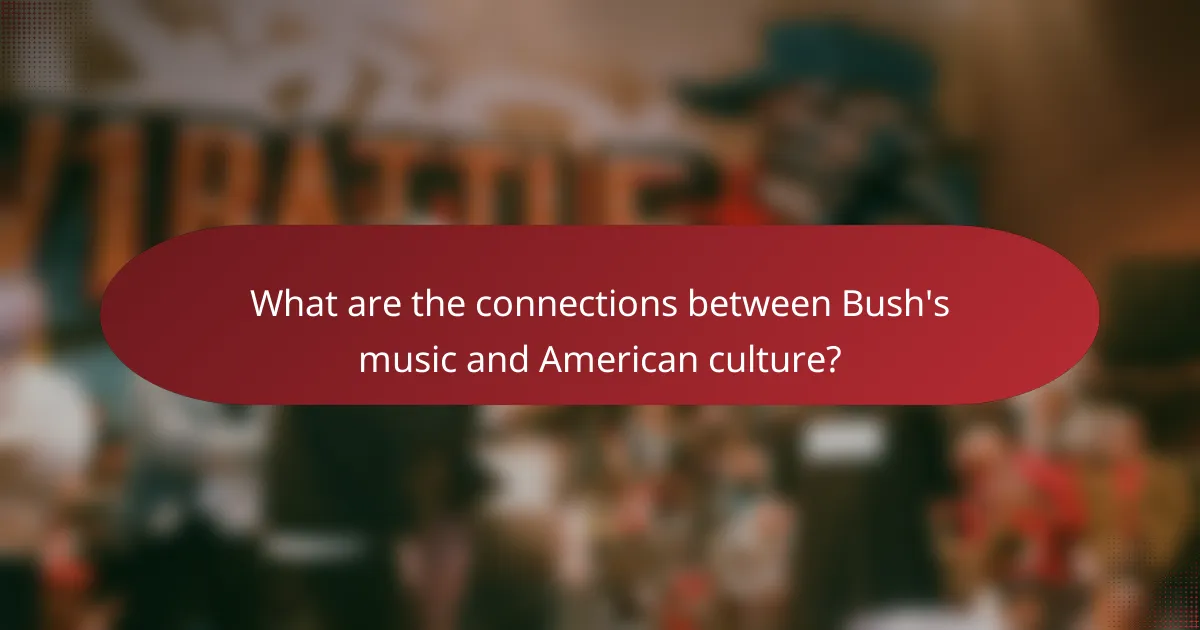
What are the connections between Bush’s music and American culture?
George W. Bush’s music choices reflect significant aspects of American culture, showcasing the intersection of personal taste and national identity. His musical preferences often resonated with themes of patriotism, tradition, and the American experience, influencing public perception during his presidency.
Music as a reflection of national identity
Music serves as a powerful medium for expressing national identity, and Bush’s selections highlighted traditional American values. Country and classic rock genres, prevalent in his playlists, evoke a sense of Americana that resonates with many citizens. This connection reinforces the idea that music can encapsulate the spirit of a nation, particularly during pivotal moments in history.
For example, during his presidency, songs like “God Bless the USA” became anthems of resilience following national tragedies. Such choices not only reflect personal affinity but also align with broader cultural sentiments, reinforcing a collective identity among Americans.
Influence on contemporary artists
Bush’s music preferences have influenced contemporary artists by spotlighting genres that emphasize storytelling and emotional depth. Many musicians have drawn inspiration from the themes present in his favored tracks, incorporating elements of patriotism and nostalgia into their work. This trend can be seen in the rise of country and folk artists who echo similar sentiments in their lyrics.
Moreover, the political climate during Bush’s presidency prompted artists to respond creatively, leading to a surge in music that critiques or supports his administration. This dynamic interplay between Bush’s music and the artistic community illustrates how political figures can shape cultural landscapes through their personal tastes.



